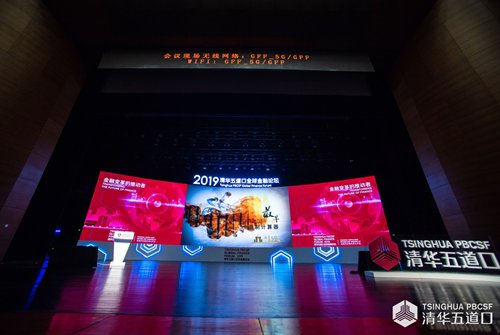SOURCE / INDUSTRIES
Tsinghua forum highlights China’s financial policy

A view of Tsinghua PBCSF Global Finance Forum 2019 in Beijing over the weekend. Photo: Courtesy of Tsinghua PBCSF
China should adopt a moderately loose monetary policy to offset the negative impact of the prolonged trade war with the US and provide a cushion against non-performing loans (NPLs) in the domestic banking system, an industry report suggested over the weekend.
The report, titled 2019 Semi-Annual Report of China's Systematic Financial Risk, was released by the Tsinghua University National Institute of Financial Research at the Tsinghua PBCSF Global Finance Forum 2019 on Saturday.
It was the first interim report on China's financial status quo since the series began in 2014.
In the first half of 2019, China's level of macroeconomic systemic risk dropped significantly compared with 2018, the report said.
Zhou Hao, Unigroup Chair Professor and Associate Dean of Tsinghua PBCSF, attributed the situation to economic stability policies, such as those that contain shadow banking, address systemic risks in the property sector and alleviate financing difficulties for private companies, the report said.
However, "as a result of lagging macroeconomic cyclical effects and policy burdens from stimulating private companies' financing," micro-level indictors, such as banks' NPLs, have risen to a high level, Zhou, who was involved in writing the report, said at the forum.
The report showed that in the first quarter of 2019, the growth rate of NPLs accelerated to above 4 percent.
On Friday, China's financial regulators moved to take control of Baoshang Bank, based in North China's Inner Mongolia Autonomous Region, after it encountered serious credit risks. It was the first city commercial bank to be taken over by regulators in almost 20 years.
As overly aggressive deleveraging could pose risks to the economy. Zhou said China's monetary policy must be kept moderately loose to maintain adequate liquidity to hedge against uncertainties from the trade war and give the country's banks more time to reduce NPLs.
"The supply-side structural reform should proceed cautiously and prudentially, and we should continue strengthening the economic fundamentals to prolong the growth momentum," said Zhou.
During the high-level forum, another report that also focuses on China's financial policies - China Financial Policy Report 2019 - was also released. The annual report, which has been published since 2011, was presented jointly by the China Center for Financial Research of Tsinghua University and the Institute of Financial Policy of Chinese Academy of Social Sciences.
The report pointed out several dilemmas faced by Chinese policymakers in 2018-2019: how to achieve a trade-off between tight regulation, which may expose financial risks, and adding leverage, which may hike future risks.
Lu Lei, deputy administrator of the State Administration of Foreign Exchange, while releasing the report at the forum, suggested that China should develop direct financing markets and continue financial supply-side reform to resolve the dilemma.
"In direct financing, capital seekers and providers directly build credit contracts via financial tools such as bonds and stock rights, which are highly liquid," whereas in indirect financing, banks act as middle men, Lu said.
"Developing direct financing could serve the real economy and boost the virtuous cycle of financial stability," Lu noted.


